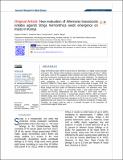New evaluation of Alternaria brassicicola isolates against Striga hermonthica seeds emergence on maize in Kenya
Publication Date
2021Author
Ogada A. Reubena, *, Ezekiel M. Njerua , Amuka Omarib , Jonah K. Birgen
Metadata
Show full item recordAbstract/
Striga hermonthica (Del.) Benth is also known as witchweed, is a highly noxious parasite
of cereal in Sub- Saharan Africa leading to enormous economic losses of above 7 billion
US$ yearly. Some of the suggested control methods have been ineffective, therefore, the
weed has continued to increase its host range and area under infestation. The objective of
this study was to evaluate Alternaria brassicicola isolates against Striga hermonthica
seeds' emergence on maize. A greenhouse experiment was performed at
KALRO/CYMMTRY Kibos station, Kisumu, Kenya during April to August, 2019. The
experiment included local maize landrace known as “Rachar”, Striga hermonthica seeds
Kibos ecotype and four strains of Alternaria brassicicola. The treatments were; Soils
(Treated) + two maize seed + S. hermonthica seeds + each isolate (LM017, LM013,
LM019a and NY021) independently and soils (Treated) + three maize seeds + S.
hermonthica seeds only (Control). A. brassicicola isolates LM019a, LM013 and LM017
inhibited Striga seeds emergence by 78.9%, 57.3% and 29.1% respectively. However,
isolate NY021 enhanced Striga seeds emergence by 30.4% over the control. This study,
established that some strains of A. brassicicola can inhibit the emergence of Striga weed.
Therefore, the fungus could be used as a possible bio-agent in the production of
mycoherbicide against Striga weed.

